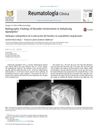 30 citations,
July 2019 in “PloS one”
30 citations,
July 2019 in “PloS one” Patients with Alopecia areata have fewer specific immune cells that normally regulate the immune system, which may contribute to the condition.
5 citations,
January 1994 in “Dermatology” Corticosteroid therapy reduces specific immune cells and promotes hair growth in alopecia areata patients.
 10 citations,
April 2019 in “Environmental Science and Pollution Research”
10 citations,
April 2019 in “Environmental Science and Pollution Research” Eating selenium-rich rice improved antioxidant activity and signs of aging in mice.
 32 citations,
May 2012 in “PloS one”
32 citations,
May 2012 in “PloS one” Thymic transplantation normalized some T-cells but not others, maintaining immune function.
 March 2024 in “International Journal of Cosmetic Science”
March 2024 in “International Journal of Cosmetic Science” Dandruff is linked to increased T cells and weakened immune protection in hair follicles.
September 2022 in “Translational Andrology and Urology” Finasteride may cause lasting sexual and mental health issues, and genetic screening could help prevent them.
 February 2024 in “Australasian journal of dermatology”
February 2024 in “Australasian journal of dermatology” Inflammatory acne damages skin stem cells and reduces their growth, leading to atrophic acne scars.

Alopecia areata, a type of hair loss, may be passed through T cells and has genetic links, while treatments vary in effectiveness. Male pattern baldness can be treated with finasteride and is influenced by androgens in hair follicles.
 October 2020 in “Our Dermatology Online”
October 2020 in “Our Dermatology Online” Chronic bacterial infections of hair follicles can cause ongoing skin inflammation.
132 citations,
April 2005 in “Gastroenterology” A gluten-free diet significantly improves skin and health issues in people with dermatitis herpetiformis, a skin condition linked to celiac disease.
 39 citations,
October 2010 in “Journal of The American Academy of Dermatology”
39 citations,
October 2010 in “Journal of The American Academy of Dermatology” Some patients with mycosis fungoides or Sézary syndrome experience hair loss, which may be similar to alopecia areata or linked to skin lesions, possibly due to abnormal T cells, and bexarotene can help treat it.
 April 2012 in “Encyclopedia of Life Sciences”
April 2012 in “Encyclopedia of Life Sciences” Different genes are linked to various types of hair loss.
 49 citations,
April 2000 in “Journal of The American Academy of Dermatology”
49 citations,
April 2000 in “Journal of The American Academy of Dermatology” Despite progress in treatment, the exact cause of Alopecia areata is still unknown.
 185 citations,
August 2005 in “Autoimmunity Reviews”
185 citations,
August 2005 in “Autoimmunity Reviews” Alopecia areata is an autoimmune condition causing hair loss due to the immune system attacking hair follicles, often influenced by genetics and stress.
 391 citations,
January 2010 in “Journal of The American Academy of Dermatology”
391 citations,
January 2010 in “Journal of The American Academy of Dermatology” Half of people with Alopecia Areata may see hair regrowth within a year without treatment, but recovery is unpredictable.
 1 citations,
January 2015 in “Advanced techniques in biology & medicine”
1 citations,
January 2015 in “Advanced techniques in biology & medicine” Down Syndrome patients with Alopecia Areata often have hypothyroidism and specific immune abnormalities.
 May 2024 in “JAMA Dermatology”
May 2024 in “JAMA Dermatology” Oral contraceptive use may increase the risk of frontal fibrosing alopecia in women with a specific CYP1B1 gene variant.

The patient with total hair loss did not regrow hair despite treatment, indicating a poor outlook for this type of hair loss.
 July 2016 in “Reumatología Clínica (English Edition)”
July 2016 in “Reumatología Clínica (English Edition)” The patient with Ankylosing Spondylitis had shoulder joint damage and bone changes.

Hidradenitis Suppurativa has genetic links, with certain gene mutations more common in patients and a third of cases having a family history.
2 citations,
October 1990 in “PubMed” Severe alopecia areata involves higher levels of certain immune cells, which can be normalized with betamethasone.
 295 citations,
January 2006 in “Journal of the American Academy of Dermatology”
295 citations,
January 2006 in “Journal of the American Academy of Dermatology” Alopecia areata, a common autoimmune hair loss condition, often runs in families.
49 citations,
November 2021 in “Annual review of pathology” Lysophospholipids like LPA and S1P are important for hair growth, immune responses, and vascular development, and could be targeted for treating diseases.
 March 2023 in “Scholars international journal of obstetrics and gynecology”
March 2023 in “Scholars international journal of obstetrics and gynecology” PCOS is a complex condition that affects women's hormonal balance and metabolism, requiring lifestyle changes and medical management.
 27 citations,
January 2013 in “The journal of investigative dermatology/Journal of investigative dermatology”
27 citations,
January 2013 in “The journal of investigative dermatology/Journal of investigative dermatology” Somatostatin may help protect hair follicles from immune attacks.
March 2022 in “Oncology Times” Tebentafusp-tebn improves survival rates in uveal melanoma patients but has common side effects like rash and fatigue.
 32 citations,
June 1976 in “JAMA”
32 citations,
June 1976 in “JAMA” Crash dieting can cause hair loss due to severe calorie restriction.
 6 citations,
May 1987 in “Acta dermato-venereologica”
6 citations,
May 1987 in “Acta dermato-venereologica” Syphilis patients showed abnormal hair root changes, with no difference between primary and secondary stages.
 January 2018 in “General internal medicine and clinical innovations”
January 2018 in “General internal medicine and clinical innovations” Busulfan/cyclophosphamide and total bone irradiation are equally effective for AML transplants.
10 citations,
April 2003 in “Clinical neurology and neurosurgery” Autoimmune polyglandular syndrome can cause temporary brain issues that may improve on their own.






















